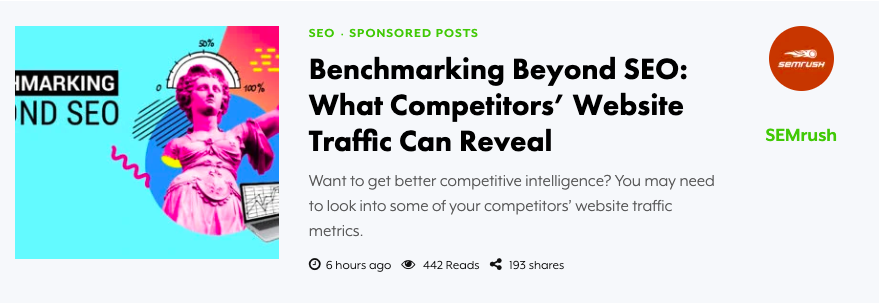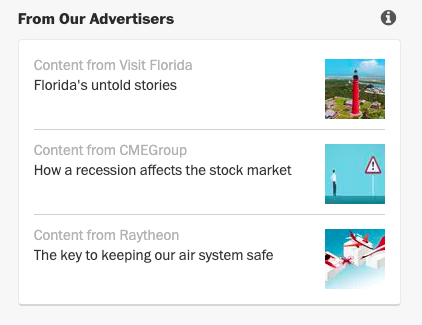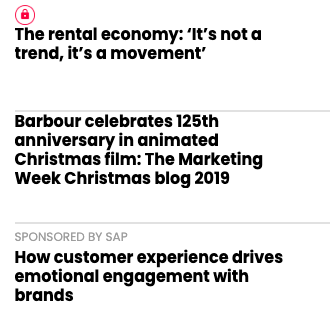As you’re reading this article, you’ve probably noticed some hype around native advertising and couldn’t help but think of how native ads would help you boost your marketing strategy.
Native advertising is the fastest-growing advertising segment, and for good reason – audiences are more open to learning about companies through native ads than traditional advertisements.
With the growing popularity of native advertising in the marketing world, one of the most common questions arising is: “Why do marketers opt for native advertising?” While native ads might seem to be the perfect choice for most companies, it’s worth considering their pros and cons before making a decision.
Let’s define native advertising
Despite all the fuss, native advertising is still a fuzzy concept for many marketing experts. So what’s native advertising?
Taboola, a native advertising platform, describes it as:
Native advertising describes any situation where branded messages fit seamlessly within their surrounding environment, engaging audiences rather than disrupting the user experience.
In other words, native ads are paid branded messages that imitate the form and function of the content upon which they appear. Unlike traditional banner ads, these ads can be of any shape or size and have only one common feature – ‘Sponsored’ label denoted by a publisher.
You face native ads every time when you surf the Internet. You might even fail to notice you face them. But you do. You find them in your social media feeds, on your favorite blog or Youtube channel.
For better clarity, here are some of the native ads examples we encountered today:
- Branded content:

- Content-recommendation widget:

- In-feed ad:

These are just some of the several types of native ads that exist in the digital environment.
The pros of native advertising
The above-mentioned examples were collected in less than five minutes, while an average consumer faces up to 10,000 brand messages a day. A bit shocking, right? Let’s find out why brands keep allocating bigger and bigger budgets towards native advertising every year.
It’s easier to catch your audience’s attention
Native ads are usually better received by their audiences. They are viewed 53 percent more frequently than display ads. People got used to ignoring marketing ads, that surround them at every turn. Because native ads don’t feel like traditional pushy ads, people are more likely to pay attention to them and consume their content.
Native advertising campaigns result in higher views, click-through rates, and greater conversions than almost any display ad.
According to Shrethrough, native ads registered an 18% higher lift in purchase intent than banner ads. If your native advertising is done well and its content appeals to your target audience, this format will be a win-win play for both sides.
Want to connect with other native advertising experts?
Join the Native Ad Talks community on Slack and learn from other professionals, share your experience, and more.
Higher credibility
Customers hate ads, which is hardly surprising. One of the biggest issues advertisers face today is that people don’t trust brands’ words anymore. While credibility is a cornerstone of a consumer-brand relationship, marketers should learn how to address a lack of trust.
Here’s where native advertising comes in handy. Customers appreciate valuable content created to provide real value, rather than simply make money. Native advertising gives brands more space to convince their audience they want to offer useable and empowering information. And when they succeed, customers reward brands with their loyalty.
You get the most relevant audience
Since native ads mainly appear on websites, blogs or platforms related to advertisers’ niche, it lets them optimize towards the most relevant audiences. People who visit specific blogs or websites are already interested in that particular niche, and if they see content related to it (even though it’s flagged as sponsored), they are more likely to click through it.
More shares = better engagement
Finally, when done right, native ads have great chances of going viral. People happily share content they like. In this case, your audience will contribute to your marketing campaign significantly.
The cons of native advertising
The advantages of native advertising are overwhelming. But native ads aren’t a one-fits-all decision. It takes time, testing and patience to make it work for your business. There are considerable drawbacks, let us provide you with some of them.
It’s difficult to take your pick among multiple options
When you finally decide to step your investment in native advertising, it’s time to choose the right platform that will help you achieve your marketing goals.
There’s definitely no shortage of native advertising companies, and it hardly makes the choice easier. When you start with paid search campaigns, you go to Google Ads; when you advertise on social media, you go with Facebook, Instagram, etc. But what are the best native ad networks to go with? How many platforms should you use to expand your reach? Is there a specific network that’s better suited for your industry or business? These are just a few questions advertisers face entering native advertising.
It takes time to produce effective ads and A/B test
Native advertising is undoubtedly a powerful method of online marketing, but you need to do it right to leverage its full potential. To attract your audience’s attention and convert them into customers, your native ads should truly stand out from the crowd. Without relevant experience, creating a genuine native ad can be challenging and takes time.
Does native advertising really work for you? Do you know which metrics you should track?
Measuring ROI is still a conundrum for many brands. Native advertising performance can often be challenging to measure, especially when you run several campaigns at once.



